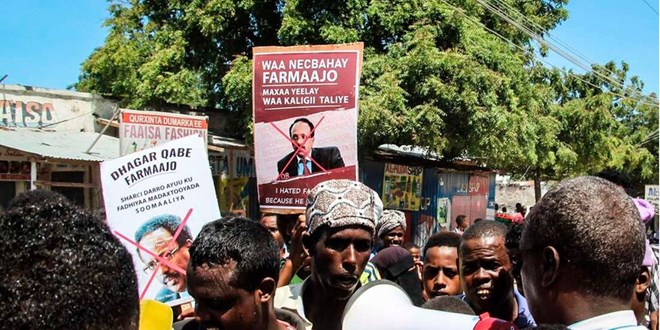
Sunday July 4, 2021

As Somalia prepares for elections starting later this month, debate has ensued on just how deep the clan will play in determining who takes which seat.
This week, Prime Minister Hussein Roble announced the final timetable for elections, indicating Senate elections will happen from July 25, followed by that for members of the Lower House.
The programme which includes training of polling officials, training of nominated delegates and elections for representatives should happen between this week and September 10.
advertisements
Thereafter, MPs of both Houses will vote for the President on October 10.This election date itself was reached following a series of failed meetings. The initial election should have been held in February and President Mohamed Farmaajo had tried to delay the polls by a year ostensibly to allow universal suffrage.
Most analysts think these elections will largely depend on who has money, connections with the federal states and campaign strategy to market oneself as the best.
Somalia had initially planned for universal suffrage, which would have been the first time since 1969. But delays in passing a new Constitution and setting up institutions capable of running those elections meant that cannot happen now.
Clan strength
But the clans that produce the delegates who vote for MPs may just be as strong this time around.
According to the model, elders from the four main clans, and a fifth group of smaller ethnic communities, work together with local electoral officials to nominate delegates who are then trained by the National Electoral Commission before they vote for MPs.
This is a slight change from before when elders were the sole determinants of delegates.
Moments after the timelines were announced, Radio Dalsan, of the main independent radio stations in Mogadishu, ran an editorial indicating that most people in Somalia, knowledgeable about elections, believe that the clan-based indirect election model in this year will not be different from the polls five years ago. In 2016, clan elders ran the show for the highest bidders.
It insists that the manner in which the current 275 legislators of the Lower House and the 54 senators of the Upper House will be voted in is vulnerable to technical errors, favouritism, and exchange of money for votes, corruption and lack of transparency.
Some analysts have also raised concerns about the timelines, suggesting they may still be missed due to other factors.
Mr Isse Farah, a Mogadishu-based political analyst, told Nation that the electoral process may drag on beyond October.
“Agreeing on a timeline is a positive move and a gesture of goodwill, but the schedule was drafted before a solution was found for many possible obstacles,” said Farah.
He indicated that certain issues, for instance, the reconciliation mission for Gedo in Jubbaland may mean the voting there will be delayed.
“The National Consultative Council should have approved and allowed time to solve the Gedo region’s election problem and then come up with the election timeline,” Farah said, indicating that it is like putting the cart before the horse.
Security aspect
There is also the issue of security and logistics. Al-Shabaab, the terrorist group remains the biggest threat on public gatherings, besides the Covid-19. Aidarus Hassan, a Mogadishu-based intellectual and keen political observer told Nation that both logistics and security may delay the implementation according to the chosen timetable.
“It looks that the parties have not given security and logistical works due considerations,” remarked Hassan, pointing finger at the massive arrangements required to organise thousands of delegates and officials.
“Imagine meeting the security and movement of so many people in an era of terrorism and spoilers,” he added.
Though Somali politicians generally spend a lot to get elected, including bribing delegates, few are willing to speak about the budget for the polls.
In 2019, then Somali Independent Electoral Commission (SIEC) chairperson, Ms Halima Ibrahim Ismail, told the Lower House of Parliament that preparations for universal suffrage could cost $70 million while indirect polls would need $45 million. The latter would need at least eight months, while the former needed two years.
Mohamed Shire, a political rights campaigner in Somalia, said that the civil society organisations have established an information centre to monitor the elections.
“At the centre, we will be analysing data and information emerging from the electoral sites and people concerned,” Shire.
“The ultimate aim is to blow whistle against any problem before it grows out of proportion,” he added, anticipating many litigations and grievances.
Similarities to 2004
Indirect elections were chosen after failure to organise one-person-one-vote elections, but this is not entirely President Farmaajo’s failure.
Somalia has been trying this since the largest ever reconciliation conference held by Somali politicians in Mbagathi, Nairobi, in October 2004.
In fact, the choice of the October 10 date for this year’s presidential election looks like a repetition of the event in 2004.
On October 10, 2004, in a session held by the hitherto Somalia’s Transitional Federal Parliament at Kasarani Stadium in Nairobi, Abdullahi Yusuf Ahmed, a former army Colonel, was elected President.
Madobe, Senate Speaker in new Somali political alliance
After several attempts to establish his base in the Somali capital Mogadishu, Ahmed eventually succeeded to set up his office in December 2006 at Villa Somalia, the presidential palace.
Somalia just turned 61, and the hope is that in four months, the country will have its 10th president in Villa Somalia.
Time will tell whether there will be a new face, if an old guard will return or if the incumbent will retain the throne.